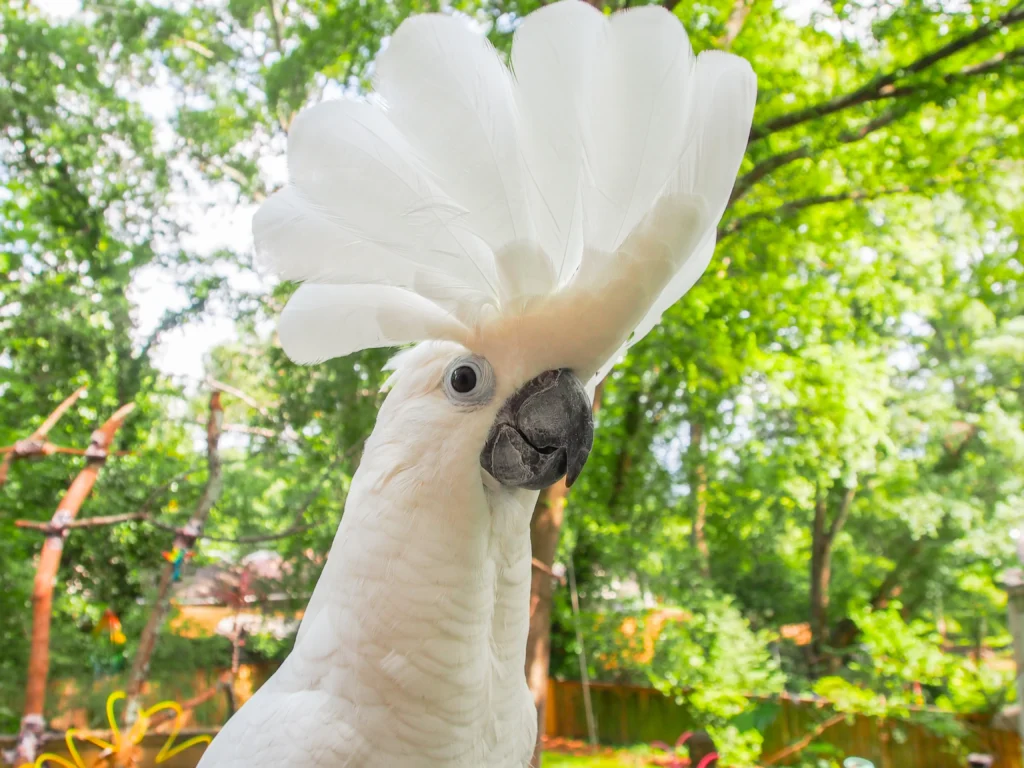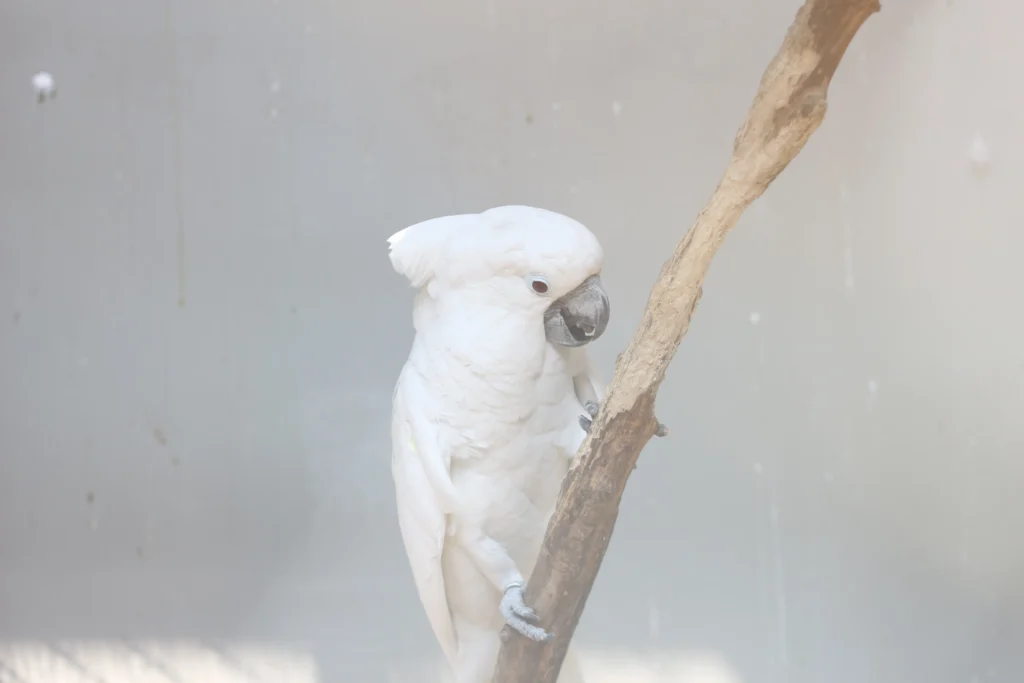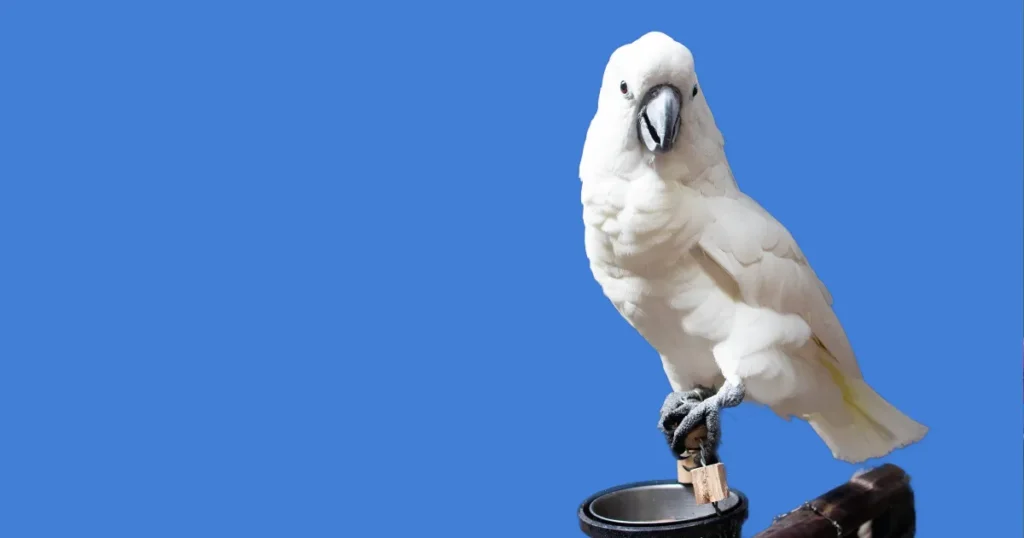Table of Contents
- Understanding the Umbrella Cockatoo Parrot
- Personality Traits and Behavioral Characteristics
- Essential Care Requirements for Your Umbrella Cockatoo
- Dietary Needs and Nutrition Guidelines
- Training and Socialization Methods
- Health Considerations and Common Medical Issues
- Exercise and Entertainment Requirements
- Cost of Ownership and Initial Investment
- FAQ
Explore the magical world of the umbrella cockatoo parrot. These birds have captured the hearts of many in the United States. They are smart and loving, making them special pets.
Are umbrella cockatoos good pets? It depends on your lifestyle and commitment. They need lots of attention, interaction, and special care. Owners must be ready to provide mental stimulation, emotional connection, and daily support.
This guide will cover everything about caring for an umbrella cockatoo parrot. You’ll learn about their behavior, nutrition, and more. This will help you decide if they’re the right pet for you.
Key Takeaways
- Umbrella cockatoos require extensive daily interaction and mental stimulation
- These parrots form deep emotional connections with their owners
- Specialized diet and environmental care are critical for their well-being
- Potential owners must commit significant time and resources
- Professional guidance is recommended for first-time cockatoo owners
Understanding the Umbrella Cockatoo Parrot
Explore the world of umbrella cockatoos, birds known for their stunning white feathers and unique personalities. These smart parrots are more than just pretty faces. They are complex creatures with traits that make them stand out.
Umbrella cockatoos are captivating birds that need special care. They are different from their Moluccan cockatoo cousins in many ways. These differences make them special in the parrot world.
Physical Characteristics
When looking into umbrella cockatoo care, their physical traits are striking. These birds have:
- Pure white feathers with a stunning yellow-tinged crest
- Large body size, typically reaching 18-24 inches in length
- Distinctive broad, fan-like crest that opens like an umbrella when excited
- Weight range between 16-28 ounces
Natural Habitat and Origins
Umbrella cockatoos come from the Indonesian islands. They live in tropical rainforests. Their home includes Indonesia, especially Sulawesi and nearby areas. This background affects their care and behavior.
Species Recognition Features
It’s important to know how to tell an umbrella cockatoo from a Moluccan cockatoo. Key differences are:
- Umbrella cockatoos have pure white plumage
- Moluccan cockatoos have a pinkish-white coloration
- Umbrella cockatoos have a larger, more pronounced crest
- Size variations between the two species
Knowing these differences helps owners give the best care to umbrella cockatoos. It also lets us appreciate their unique nature.
Personality Traits and Behavioral Characteristics
Umbrella cockatoos are known for their smartness and love for people. They form strong bonds with their owners, making them very loving pets. Training them needs patience and regular interaction.
It’s important to know about their talking skills. These birds can talk clearly, mimicking humans. They communicate in ways that go beyond just talking. There are many reasons why they scream:
- They want attention from their family
- They express their feelings
- They react to their surroundings
- They show excitement or discomfort
These birds have deep emotions and need lots of attention. They are playful and loving, but also need boundaries. If they don’t get enough mental and social stimulation, they might get destructive.
To train them well, you need to build trust. Give them mental challenges and a structured space. This supports their curiosity and social nature.
Essential Care Requirements for Your Umbrella Cockatoo
Caring for an umbrella cockatoo needs dedication and patience. They are smart and social birds. They need a lot of attention and special care to be happy at home.
Housing and Cage Setup
Choosing the right cage is key when caring for an umbrella cockatoo. The cage should be big to fit their wide wings. Here are some size guidelines:
- Minimum width: 3 feet
- Minimum height: 4-5 feet
- Bar spacing: 3/4 to 1 inch
Your cage should have different perches, food and water dishes, and toys. These keep your bird’s mind active.
Temperature and Environmental Needs
Umbrella cockatoos need a stable, warm place to live. Keep the temperature between 65-80°F. Stay away from cold drafts and direct air vents. Keep the humidity level between 50-70% to prevent health problems.
Daily Care Routine
Knowing how much attention an umbrella cockatoo needs is important. They need:
- 4-6 hours of direct interaction daily
- Regular time out of their cage
- Constant mental and physical challenges
| Care Aspect | Daily Requirement |
| Social Interaction | 3-4 hours |
| Feeding | 2-3 scheduled meals |
| Exercise | 1-2 hours out of cage |
Pro tip: Create a daily routine for your umbrella cockatoo. This makes them feel safe and loved. It also helps prevent bad behavior and strengthens your bond.

Dietary Needs and Nutrition Guidelines
Knowing what umbrella cockatoos eat is key to their health and happiness. A balanced diet for these birds needs careful planning and attention to nutrition.
A healthy diet for these birds includes several important parts:
- High-quality commercial pellets (50-70% of daily diet)
- Fresh fruits and vegetables
- Limited seeds and nuts
- Clean, fresh water daily
Pellets are the base of a healthy diet for your bird. Add fresh produce to make sure they get all the nutrients they need. Recommended fruits and vegetables include:
- Carrots
- Leafy greens
- Apples
- Berries
- Squash
Stay away from toxic foods like avocado, chocolate, and caffeine. These can harm or even kill your bird.
It’s important to control how much food your bird eats. Adult umbrella cockatoos need about 1/4 to 1/2 cup of pellets a day, plus fresh produce. Talking to an avian vet can help you create a diet plan that fits your bird’s needs.
“A balanced diet is the cornerstone of a healthy, vibrant cockatoo” – Avian Nutrition Experts
Training and Socialization Methods
Training an umbrella cockatoo needs patience, consistency, and understanding. These smart birds need special training methods. These methods are different from what you might use with other pets.
Basic Command Training Fundamentals
Starting umbrella cockatoo training with clear communication is key. Use positive reinforcement to reward good behavior. This approach helps your bird learn faster.
- Use small food rewards for successful commands
- Keep training sessions short (10-15 minutes)
- Practice commands in a quiet, distraction-free environment
- Repeat instructions calmly and consistently
Managing Aggressive Behaviors
To tame an aggressive umbrella cockatoo, understand their emotional triggers. Spot signs of stress and use special techniques to change their behavior.
| Behavior | Intervention Strategy |
| Excessive Screaming | Ignore the behavior, reward silence |
| Biting | Use gentle redirection, avoid punishment |
| Territorial Aggression | Establish consistent boundaries |
Building Trust and Connection
To form a strong bond with your cockatoo, have consistent, gentle interactions. Spend quality time together, speak softly, and act calmly. This helps build trust between you and your bird.
- Speak in soothing tones
- Offer gentle head scratches
- Respect the bird’s personal space
- Be patient during socialization process
Health Considerations and Common Medical Issues
It’s important to know about the health of umbrella cockatoos to keep them well. These smart birds can face many health issues. Keeping your umbrella cockatoo healthy is key to their long life, which can be up to 60 years in a home.
- Respiratory infections
- Feather plucking syndrome
- Nutritional deficiencies
- Psittacosis (parrot fever)
- Chronic stress-related conditions
Spotting health issues early is vital. Look out for signs like:
- Changes in droppings
- Unusual vocalization patterns
- Decreased appetite
- Lethargy or reduced activity
- Abnormal feather appearance
“Prevention is always better than cure when caring for your feathered companion.” – Avian Veterinary Association
To help your umbrella cockatoo live a long life, take them to the vet regularly. Give them a balanced diet and a stress-free home. Good nutrition, mental play, and regular vet visits can prevent many health issues.
Remember, every cockatoo is different, and their health needs can vary. Talking to an avian specialist can give you advice tailored to your bird.
Exercise and Entertainment Requirements
Umbrella cockatoos are very smart and full of energy. They need lots of mental and physical play to stay happy and healthy. Without enough fun and exercise, they might get stressed or have bad behaviors.

Recommended Toys for Mental Engagement
Choosing the right toys for umbrella cockatoos is key. Look for ones that make them think and play. Here are some great options:
- Puzzle feeders that require manipulation
- Foraging toys with hidden treats
- Destructible wood and rope toys
- Interactive swing sets
- Noise-making musical toys
Physical Activity Recommendations
Umbrella cockatoos need to get out of their cage every day. Make a safe area for them to climb, stretch, and play. They love climbing, perching high, and flying under watchful eyes.
Companion Considerations
Do umbrella cockatoos need a friend? They are social birds, but not all like having another bird around. Some prefer being with people and might get upset with another bird. If you’re thinking of getting another bird, introduce them slowly and watch how they react.
| Activity Type | Duration | Benefits |
| Supervised Playtime | 2-3 hours daily | Physical exercise, mental stimulation |
| Foraging Games | 30-45 minutes | Cognitive development, natural behaviors |
| Interactive Training | 15-20 minutes | Bond strengthening, mental challenge |
Every umbrella cockatoo is different. Watch how your bird likes to play and adjust activities to keep them joyful and well.
Cost of Ownership and Initial Investment
Thinking about getting an umbrella cockatoo? You’ll need to plan for more than just the bird itself. The price can be between $1,500 and $3,500. This depends on the bird’s age, family history, and where you buy it from. It’s important to do your research before you buy.
First-year costs include a big cage ($200-$500), special perches, toys, and food. You’ll also need to pay for vet visits, which are key for your bird’s health. These can cost $200-$500 a year. When looking for a bird, remember to include the cost of food, fresh fruits, and new toys to keep your bird happy and busy.
You might need to change your home to fit your new bird. Cockatoos need lots of space and special care items. You’ll also need to budget for special diets, bird-safe furniture, and emergency vet visits. Adopting a bird can be cheaper, with rescue centers offering them at lower prices.
Remember, owning an umbrella cockatoo is a big commitment. These smart birds can live 50-70 years. So, you’ll be making a big financial and emotional investment for many years. Planning carefully and understanding all the costs will help you give your bird the best life.
FAQ
How long do umbrella cockatoos typically live?
With proper care, umbrella cockatoos can live 40-60 years in captivity. This makes them a lifelong companion. You’ll need to plan for long-term care and make provisions for their future if you can’t continue caring for them.
Are umbrella cockatoos good pets for first-time bird owners?
No, umbrella cockatoos are not good pets for first-time bird owners. They need a lot of attention, specialized care, and have complex emotional needs. These birds require daily interaction, professional training knowledge, and can be loud and challenging without experienced handling.
What is the typical cost of an umbrella cockatoo?
Umbrella cockatoos cost between $1,000 to $3,000 from a reputable breeder. But the cost doesn’t stop there. You’ll also need to budget for their diet, veterinary care, a large cage, toys, and home modifications.
What do umbrella cockatoos eat?
Their diet should be high-quality pellets (about 70%), fresh fruits and vegetables (20%), and a small portion of seeds (10%). They love leafy greens, carrots, apples, and specialized cockatoo pellets. Avoid giving them avocado, chocolate, and caffeine, as these are toxic.
How much daily attention do umbrella cockatoos need?
Umbrella cockatoos need 4-6 hours of direct interaction and out-of-cage time daily. They are very social and can get depressed or develop behavioral problems without consistent engagement. Your commitment must include regular play, training, and emotional connection.
Do umbrella cockatoos talk?
Yes, umbrella cockatoos are excellent talkers and can learn many words and phrases. They have a remarkable ability to mimic human speech with clear pronunciation. However, individual talking capacity varies, and consistent training is key to developing their vocal skills.
What size cage do umbrella cockatoos need?
You’ll need a large cage, at least 24 x 24 x 36 inches, with horizontal bar spacing of 3/4 to 1 inch. The cage should allow room for multiple perches, toys, and wing-spreading. Remember, larger is always better for these active birds.
Are umbrella cockatoos prone to any specific health problems?
Common health issues include respiratory infections, feather plucking, psittacosis, and nutritional deficiencies. They are also susceptible to obesity and psychological stress if not provided proper diet and mental stimulation. Regular veterinary check-ups with an avian specialist are crucial for maintaining their health.
Can umbrella cockatoos live with other pets?
Careful introduction and supervision are essential. They can potentially coexist with other pets, but their strong personality and territorial nature mean socialization must be gradual and controlled. Predatory pets like cats and dogs should never be left unsupervised with a cockatoo.
How often do umbrella cockatoos need veterinary check-ups?
Annual comprehensive check-ups are recommended, with potential additional visits for specific health concerns. Younger and older birds might require more frequent monitoring. Always choose a veterinarian specializing in avian care to ensure proper examination and treatment.
